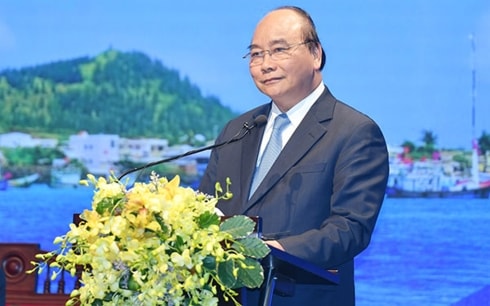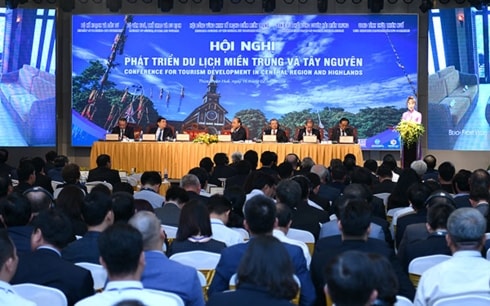Prime Minister Nguyen Xuan Phuc: Strictly handle the problem of "overcharging" tourists and illegal taxis
Pointing out the situation of "ripping off" tourists along with the problem of illegal taxis, soliciting, unsanitary conditions, and lack of security, the Prime Minister requested localities to handle the matter seriously...
On the morning of February 16, at the famous tourist destination of the ancient capital of Hue, the Conference on Tourism Development in the Central and Central Highlands took place with the participation of about 500 delegates including leaders of ministries, branches, localities, international guests, and businesses operating in the tourism sector.
|
| Prime Minister Nguyen Xuan Phuc speaks at the conference. |
The Central Highlands region has 19 provinces and cities, a population of 24 million people, nearly 1,900 km of coastline with a series of world-class beaches, many beautiful world-class bays stretching from Thanh Hoa to Binh Thuan. This is an important region on the Vietnam tourism map with 12 airports, including 5 international airports; 10 first-class seaports, of which Chan May deep-water port, Thua Thien-Hue can receive the world's largest ships.
The region has potential for ecotourism with famous mountains, waterfalls and lakes concentrated in the Central Highlands. In addition, there are 9 national parks and 11 world cultural heritages. In 2018, of nearly 15.5 million international visitors to Vietnam and more than 80 million domestic visitors, the Central Highlands accounted for 9.5 million international visitors and 56 million domestic visitors.
Speaking at the conference, although highly appreciating the potential and strengths of tourism development in the Central Highlands region, as Associate Professor Dr. Tran Dinh Thien said, the greatest "strength" of the region is that everyone does their own thing. Therefore, it is necessary to promote regional linkages through an effective regional coordination mechanism instead of the current fragmented one.
Sharing this view, economic expert Tran Du Lich said that tourism cannot be developed by point and administrative area but must be developed by region. Another point, according to Dr. Tran Du Lich, is to link private economic development with tourism development.
“In the tourism industry, the role of the private economy is more important. It seems that the leading cranes creating tourism highlights are domestic private enterprises. Policies are needed for these leading cranes, domestic private corporations to do tourism. If these private organizations are linked with residents and small businesses to create spillovers, they will have a formidable strength in the true sense of linking tourism development,” said Mr. Tran Du Lich, adding that one of the driving forces that has helped Vietnam’s tourism develop strongly in recent times is thanks to the development of our country’s airlines.
Mr. Don Lam (VinaCapital Investment Fund) assessed that to develop the tourism economy, it is important to invest in airports and open the sky more. Sharing the same view, Mr. Nguyen Quoc Ky, General Director of Vietravel Tourism Company, said that in addition to developing service products, it is necessary to establish direct flights from potential markets to Vietnam to attract international visitors. Because in reality, there are direct flights to Vietnam, but those planes are not allowed to fly domestically in Vietnam, making it difficult to attract tourists.
Meanwhile, Vietjet Air General Director, Ms. Nguyen Thi Phuong Thao, said that Vietjet is the pioneer airline in opening flights to local airports in the Central Highlands and is currently present at 12 airports in the region, contributing to the development of tourism and the local economy. Sharing the same proposal to create more favorable conditions for the development of the aviation industry, she said that she will continue to cooperate closely with the provinces and cities in the Central Highlands to continue to increase the frequency of flights, promote the opening of more international flights and tourism promotion activities.
Delegates also said that it is necessary to quickly consider visa exemption and issue e-visas quickly, because currently our country exempts visas for citizens of 24 countries, while Thailand exempts visas for citizens of 57 countries, Indonesia 168 and Malaysia 162.
Concluding the conference, Prime Minister Nguyen Xuan Phuc stated that the Central Highlands region has favorable conditions to develop tourism clusters such as resort tourism, cultural-historical tourism, sea and island tourism, heritage tourism, mountains and caves...
An industry cluster includes many related industries, in which the center is natural and artificial tourism resources, surrounding are food, accommodation, recreation and entertainment services. In addition, there are industries that provide input factors, related support services such as finance, banking, insurance; provide local products, asset management, especially health care, security and safety. And so, one way to put the problem is to develop a synchronous industry cluster rather than simply taking tourism resources.
|
| Overview of the conference. |
Agreeing with many delegates, the Prime Minister said that the tourism resources of the Central Highlands are still “rough gems” and have not yet found a worthy “goldsmith”. Having many tourism resources is sometimes a disadvantage, making it difficult to find an identity, brand recognition, and hesitation in choosing priorities, including investment priorities in the context of limited resources...
The Prime Minister also pointed out the shortcomings in the region's tourism development, such as imbalance, lack of depth, lack of identity or unimpressive nuances; lack of a tourism architecture that clearly reflects the nature of Vietnamese tourism. The service quality and service capacity of accommodation facilities, hotels, restaurants, and entertainment areas have not met the requirements of tourists, especially luxury and high-class tourists.
Pointing out the situation of "ripping off" tourists along with the problems of illegal taxis, soliciting, street vendors, unsanitary conditions, and lack of security, the Prime Minister said that this negatively affects the image of Vietnamese tourism and requested localities to handle it seriously.
Believing that the tourism industry is still slow to innovate both in content and form, the Prime Minister gave an example that he has long heard about the Central Heritage Road, which, although very successful, seems to be "resting on its laurels".
Regarding the development orientation of tourism in the Central Highlands region in particular and the whole country in general, the Prime Minister directed that the tourism industry continue to answer the 5 questions that the Prime Minister raised in 2016.
“First, how to get more tourists to come to Vietnam; second, how to get tourists to stay longer; third, how to get tourists to spend more money instead of having nothing to spend. The President and Secretary must observe what tourists buy and what their psychology is so that they can consume the products. Fourth, how to get tourists to tell interesting stories to their relatives and friends in an exciting way instead of criticizing or saying something bad about Vietnam; fifth, how to get tourists to come back as soon as possible instead of never coming back. I am alarmed that compared to some countries next to us, the number of tourists returning to Vietnam is low,” said the Prime Minister.
Recalling the organization of the national tourism development conference in Hoi An in 2016, the Prime Minister said that this was because Hoi An is a place that has done well in developing community tourism, and the people are always friendly and hospitable. Pointing out this, the Prime Minister emphasized the development of community tourism, taking people as a factor in sustainable tourism development.
Along with that, it is necessary to change the way of promoting the image of Vietnam tourism, especially there is no more effective way than promoting the image of each Vietnamese citizen as a tourism ambassador. Along with diversifying tourism products, it is important to focus on developing local products and tourism products associated with people's livelihoods.
“Along with local products, the tourism industry must think about bringing local culture to tourists in a deeper, more impressive way, with tourist footprints spreading all over the world. Many foreign tourists come to Sapa not only because of the good climate, but mainly because they want to see the daily life, culture, cuisine, Khau Vai love market... like. Here (Central Highlands - Central region), each locality has its own culture. Or breathe life into the country's cultural and historical stories. There are many heritages and relics here, each place has its own characteristics. Especially in the Central region, it is necessary to develop homestay community tourism to bring the world closer to the people, bring local culture to the world, and create better income for the people" - the Prime Minister directed.
Agreeing with experts on the role of private economic groups, the Prime Minister emphasized that the development of tourism in the Central Highlands region has an important contribution from strategic investors and large enterprises, most of whom were present at this conference. These include brands such as Sungroup, Vingroup, travel agencies, especially 4 airlines, including Vietnam Airlines and Vietjet, because 80% of international tourists come to Vietnam by air. It is necessary to create competition, improve quality between airlines, and facilitate the development of airlines. With that reality, the Prime Minister hopes that large corporations will continue to join hands with the Government and provinces to develop tourism in the Central Highlands region.
In addition to the need to invest more heavily in tourism development infrastructure, the Prime Minister said that localities should avoid investing in tourism development following trends, avoiding the situation where every province has a night market or organizes festivals. Travel agencies should not only focus on existing tourists but also attract potential tourists with high spending ability such as those from Europe, Japan, North America, China... The tourism industry needs to research and create a list of elite citizens in countries to create more favorable conditions such as granting them green cards.
Regarding the fact that Vietnam has exempted visas for citizens of 24 countries and granted e-visas to 57 countries, the Prime Minister said that he had just signed a resolution to apply e-visas to 34 more countries. So far, 105 countries and territories in Vietnam have applied e-visas./.


